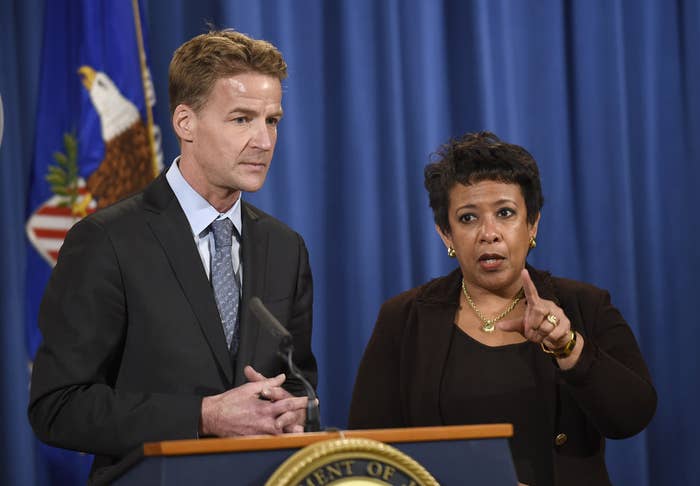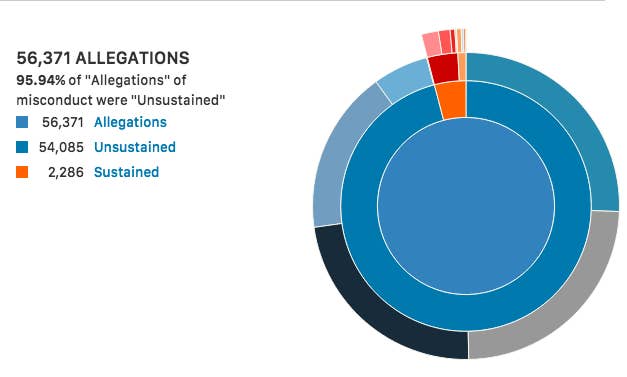
While the U.S. Department of Justice prepares to undertake its largest ever investigation of a domestic police department, a pending lawsuit by Chicago's police unions has the potential to jeopardize hundreds of thousands of police records that could be used in the DOJ's probe.
Last year, independent local journalist Jamie Kalven, whose reporting was credited with helping to unearth the Laquan McDonald police shooting video, won a lawsuit against the city to release a trove of police misconduct complaints. An Illinois Appeals Court had ruled that the city must honor Kalven's Freedom of Information Act request and hand over police department misconduct complaints dating back to 1967. Following the court's decision, Chicago's two main newspapers, the Chicago Tribune and Sun-Times, joined Kalven in requesting the files.
"The documents sought are not the underlying investigative files, but rather a list of every complaint and its disposition over the last 48 years. According to the city, the requested information comes to more than 7,000 pages," Kalven wrote in an op-ed article for the Sun-Times.
Earlier this year, the Chicago police unions filed a countersuit against the city, arguing that all police records older than five years can be erased or destroyed per the union members' collective bargaining agreement.
As a result, the court granted the cops an injunction, which to date has kept the city from giving the journalists all the files. Kalven, however, was able to obtain more than 56,000 police misconduct complaints from the past four years — those documents are not protected by the unions' collective bargaining agreement — which he has published on a website.
A chart from the website published by Kalven and the Invisible Institute shows that more than 56,000 allegations of misconduct resulted in just over two thousand inquiries by investigators.

Since the unions took up the fight to keep the documents secret, the momentum in this case has shifted in the favor of the police. The Washington Post first reported last week that an arbitrator sided with the Chicago Police Benevolent & Protective Association, the union that represents higher-ranking officers including sergeants and lieutenants, saying their contract would allow the police to erase records older than five years. An arbitrator is also expected to rule in favor of the Fraternal Order of Police, the union that represents Chicago's rank and file officers, Kalven and his attorney Craig Futterman told BuzzFeed News.
In order to stop any immediate destruction of documents, Kalven, who is not named as a defendant in the lawsuit by the unions, petitioned the state court and a judge ruled that the police must first notify journalists and activists if they intend to destroy any of the records.
"We just won at the end of last week. I call it a bandaid or a very quick time out," Futterman said.
"It's an order that the city has to give us two weeks notice if they're going to destroy these records. It's a short window for a more a permanent solution."
The expunging of old records would undoubtedly leave a hole in Chicago's checkered police history that activists are hoping the DOJ takes a good look at. For example, some police records older than five years that would qualify for destruction include complaints from the highly controversial time period when police commander Jon Burge and others engaged in regular torture practices of Chicagoans in order to gain coerced confessions. The tactics landed Burge in prison after the ex-cop, who served on the force from 1970 until he was fired in the early-90s, was convicted of lying to investigators in 2010.
Kalven says that if his side prevails and the records are released, he will be able to have the data up on the Invisible Institute's website in a matter of weeks.
"So many patterns are going to emerge. There are scores of people in prison who have claimed their confessions were coerced by torture. Having this information available to them is of great immediate importance," Kalven said.
While the issue of making these old records public remains very much in limbo, no documents in question have yet been destroyed, and it is likely they will be preserved now that the DOJ has opened its investigation.
Chicago attorney Matt Piers, the former Deputy Corporation Counsel for the City of Chicago under Mayor Harold Washington, told BuzzFeed News that it is likely that federal investigators will step in and order the City not to destroy or erase the documents. Or, alternatively, the City's Corporation Counsel will make the decision to preserve these documents on its own, despite what is written into the police's contract.
"On destroying the records, my guess is that that will not happen. Typically when you have an investigation like this, a document preservation letter gets sent out. Collective bargaining agreements are just contracts, they're not magic," Piers said.
Bill McCaffrey, spokesperson for the City's Corporate Counsel said, "Consistent with our longstanding position that police disciplinary records continue to have a sufficient administrative and legal purpose to warrant preservation, the City supports any efforts, including changes by the Local Records Commission to the Department's retention schedules, that would allow the City to continue to indefinitely preserve police disciplinary records."
BuzzFeed News has reached out to the Department of Justice about the status of these records and is waiting to hear back.
On Monday, U.S. Attorney General Loretta Lynch announced that the DOJ's civil rights department would rigorously review the Chicago police department's "patterns and practices" and how Chicago holds its officers accountable. The investigation is expected to take over a year.
BuzzFeed News contacted Chicago's Fraternal Order of Police and asked if the federal investigation had changed anything with regards to their case seeking to protect these police misconduct reports from public view.
"Our litigation concerning the destruction of files will proceed as scheduled," FOP President Dean Angelo, Sr. told BuzzFeed News.
Angelo added that the union has had no communication with the DOJ.
"This is the very evidence that is required to assess the police's accountability system. At this moment, to have it go up in a bonfire, it's almost inconceivable," Kalven said.
